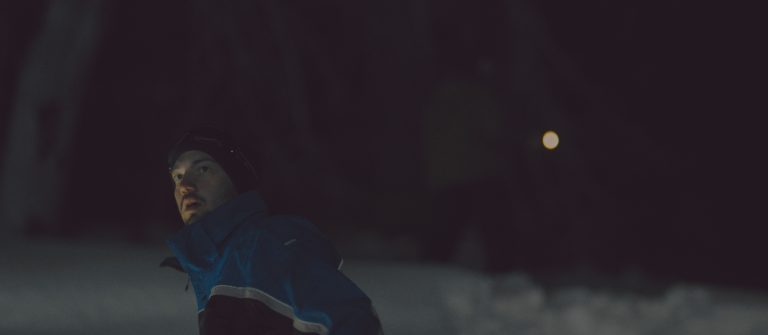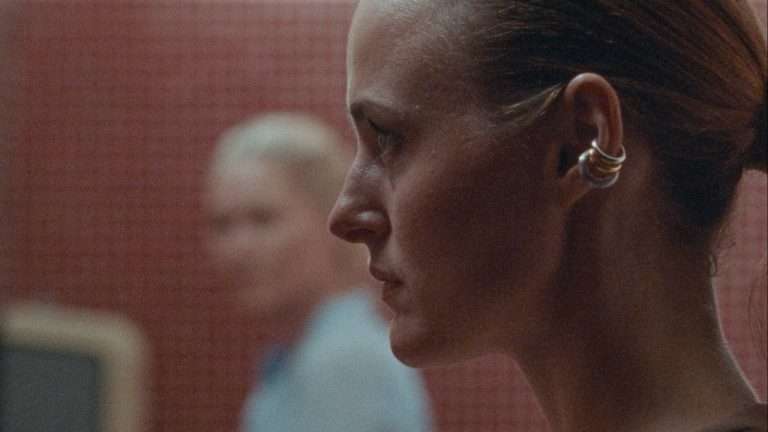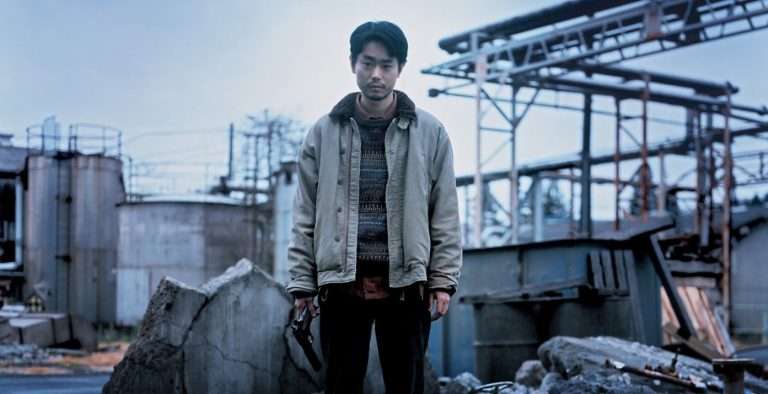Double Walker opens right after Christmas, with a family coming to terms after the untimely death of their daughter (Layla Pritt). The details are unknown- and will remain so for quite some time- as the introductory shots space out to distill the chilly Midwestern hometown. The course of action leads to an unknown woman in the woods- but even before her identity is disclosed, you know exactly where Double Walker is headed. The result is an uneven, strange film that isn’t sure where it is headed.
Reminiscent of Jonathan Glazer’s sci-fi masterstroke Under the Skin, where Scarlett Johansson’s exotic alien drove her way to Glasgow market, here it is Sylvie Mix’s snow-white apparition on a mission. The ambiguity is less persistent, still, her ice-cold presence manages to fill the quietest moments with a striking spell. Not long after it is revealed that she is the ghost of her own- a dimension of their age difference is bracingly interesting yet left unexplored. She’s not visible to everyone, except for believers and sinners- she explains, in a voiceover. An overused, if presumptuous dream sequence throws some light on her existence. Saturated with a ghoulish figure to an unexplored land, she was given two choices- to live one more day as a human or live forever as a ghost. She went with the latter.
Related to Double Walker – Hell or High Water [2016]: Reinventing the Vengeful West
West follows her as she hunts down the possible culprits behind her death. She first meets Brian (Justin Rose) who rescues her, but with ulterior motives that ultimately prove fatal for him. Just as she is about to make her next move, she is distracted by Jack (Jacob Rice)- who proves to be too sweet to provide shelter to a stranger without bothering a question. She also returns to her house- beside her mother Catherine (Mix’s real mother, Maika Carter). Meanwhile, Jack provides her clothes, old boots and introduces her to his movie theatre. Occupied with the gracious presence of Jack, of what could have been a normal life, she devotes time for her manhunt in the nocturnal hours. This is her crisis- the ghost becomes vulnerable: a victim to her own desires.
West stylishly unlocks the little revelations in the narrative threads with a matching flair for visual detail. But the story, written by Mix and developed by West himself- leaves out way too many narrative holes for comfort. Given that its sci-fi world precludes such expectations, it will nevertheless alienate viewers in its refusal to slip into a convention. What happens on that exact night is evaded only for narrative grasp- which actually turns on its own head. By the time, the revelation occurs, the interest has long evaporated- so much so that the bracing undercurrents of domestic violence and sex trafficking are barely felt.
Double Walker holds on to develop several such moments but somehow overplays it to modify a kind of socio-realist grit. It feels unsure of its own potential at times, simply interested in exploring ideas rather than holding them together. Catherine’s impact, which was the foundation for Double Walker, as the director says, is left largely undone by her own silence. As a witness to the trauma, and a lifelong of abuse, her passivity holds space- but till how long?
Also, Read – DOUBLE LIFE [2017]: NYAFF REVIEW
Rice tries his best with a character that feels uncharacteristically one-note. Caught between two worlds, Mix inhabits the narrative space with a carefully wound-up unreadability. Her ghost is caught unguarded and vengeful, capable yet reticent- even as her characters’ reasonability is left to that dream alone. Several questions are left unanswered. One never quite gets to know why she would become a ghost at that age only? What else could she know about her life, if not through her dreams? If her mother can see her why are the conversations always one-sided? What are the consequences of the involvement of the police?
Even as Double Walker opens up to a reasonably well-intentioned finale – the overturns feel clunky and mired in randomness. Shot handsomely by cinematographer Quinn Armstrong, Double Walker works only when it understands that there is no use in understanding or reducing it to revelations. In its deliberate moments- it fails, taking on multiple threads at once, abiding by none.








